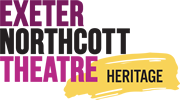Accessibility
How accessible is the Northcott? Both physically as a building, as a resource for the community, and as a platform for storytelling.
Who are its productions for? Who has the opportunity to work there or see their story on the stage? From the beginning, the Northcott was billed as a 'Theatre for Everyone' - and such bold claims of inclusivity have been grappled with ever since.
Much of the Northcott's archive research has looked at this issue and how the theatre's management and team have sought to address accessibility. A panel discussion was hosted ivy the theatre to explore the ways theatres, particularly in the context of the South West, can better serve those from a lower socioeconomic background and people living with disability.
The perception of cultural organisations such as the Northcott in the eyes of the community, and how the people running them wittingly or unwittingly shape these, has been cited as a common barrier to engagement among some of the community groups we have been engaging with using materials from the archive. What you should wear, how you should behave, how much it costs, and the type of experience you'll have when you get there, have been described by participants to be sticking points for them when they think of the theatre. These concerns aren't unfounded - in the archive, there are several instances of behaviour 'policing' from regular theatre goers in the press and in audience feedback surveys decrying 'peasants with muddy boots' or feeling people don't dress up enough to go to theatre anymore. But from the beginning of its life, the Northcott's Artistic Directors and wider team show great awareness of these barriers and are often at pains to subvert them. In what ways has the theatre become more accessible over its history - has change been slow but sure?
Panel event and Q&A
With Jenny Sealey, Artistic Director and CEO of Graeae Theatre, and Plymouth based Producer Dan Baker, the panel discussed accessibility and the arts, particularly for people from lower socioeconomic backgrounds and disabled people; how this has been approached historically and what needs to change moving forward.
You can re-watch the panel event now.
Perspectives from CEDA
We worked with CEDA and a group of their service users to look specifically at the theme of accessibility for disabled people and programming in the Northcott Theatre archive, and below are the key ideas we explored.
Ticket deals and schemes were a common feature in the theatre calendars we looked at in the archive, in an effort to make the shows it presented affordable and inclusive. Travel bursaries and networks were particularly recurrent, to address the 'theatre on the hill' image – for example, in the 1970s, The Northcott Theatre Club made a contribution of £50 towards the cost of transport for children from outlying schools - with some making journeys of 100 or more miles to get to the theatre.
All of the group had experience of going to theatres to see concerts or shows – and some had strong thoughts on the ticket deals they had encountered as being sometimes confusing or inconsistent across different venues. There was also some mixed experiences of how wheelchair friendly performance venues are, both in terms of the physical space and how welcoming or knowledgeable the front of house staff were. We designed dream venues, where every seat was wheel chair friendly, there were no stairs or lifts, the bar was well stocked, and a variety of food was on offer.
We watched digitised super 8 film footage from The Dynasts, a spectacular production presented in Exeter Cathedral in September 1980, and discussed if city centre shows were more accessible – or just perceived to be so. The Northcott has a long history of presenting work in the city centre or other areas of Exeter, from Jane Howell’s initiatives in producing plays in the RAMM, Library, and the Prison, to the use of Emmanuel Hall as a studio space from 1979. Many group participants felt that where the show happened was less important that what the show was – is it something I want to see and spend my money on?
Finally, we looked at inclusive programming, our experiences of participating in performance, and in the world behind the scenes – how inclusive are these opportunities and what stories are being told about disabled people? One of our interns looked closely at a production of A Day in the Death of Joe Egg from 1970, one of the earliest instances in the archive of the Northcott exploring the stories of families living with disability and of working in partnership with the main local service provider for disabled people at the time – Vranch House, Exeter.
The language and focus of the storytelling and press coverage at the time contrasted with the experiences of the CEDA group, many of whom had worked in recent years with the Northcott to tell their stories as part of the live performance piece Don’t Push Me Around and lockdown film When the Wheels Come Off. Key points raised were about agency in storytelling and in finding the joy in live performance – all of the group were keen on live music and musicals and felt going to the theatre could be a uniting experience.
